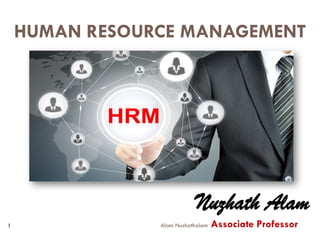
Human Resource Management HRM
- 1. Alam Nuzhathalam1 HUMAN RESOURCE MANAGEMENT Nuzhath Alam Associate Professor
- 2. Human Resource Management HRM or HR is the practice of recruiting, hiring, deploying and managing an organization's employees. A company or organization's HR department is usually responsible for creating, putting into effect and overseeing policies governing workers and the relationship of the organization with its employees. 2 Alam Nuzhathalam
- 3. HR Activities Alam Nuzhathalam 3 Recruitment: It refers to the overall process of attracting, shortlisting, selecting and appointing suitable candidates for jobs within an organization Selection: It is a process of selection and shortlisting of the right candidates with the necessary qualifications and skill set to fill the vacancies in an organisation Deployment: It is a personnel activity to ensure that the labor of the organization would be continuously in an optimal relation to the jobs and organizational structure
- 4. Cont…. Alam Nuzhathalam 4 Retention: It is a process in which the employees are encouraged to remain with the organization for the maximum period of time or until the completion of the project Promotion: It refers to the upward movement of an employee from one job to another higher one, with increase in salary, status and responsibilities Superannuation: A superannuation is an organizational pension program created by a company for the benefit of its employees. Ex. Pension Amount
- 5. Alam Nuzhathalam5 HR Acquisition 1.HR Planning 2.Recruitment 3.Selection 4.Orientation 5.Training 6.Placement HR Development 1.Career Planning 2.Training & Development Performance & Compensation 1.Performance Management 2.Incentives & Benefits Motivation & Maintenance 1.Empowerment 2.Health& Safety 3. HR Mobility 4. Creating Motivational Environment Industrial Relations 1.Discipline & Grievance Mg 2.Industrial Dispute Mg HRM FUNCTIONS HR INFORMATION SYSTEM HR Research HR Account HR Audit
- 6. HR Acquisition Alam Nuzhathalam 6 Acquisition duties consist of human resource planning for employees, which includes activities related to analyzing employment needs, determining the necessary skills for positions, identifying job and industry trends, and forecasting future employment levels and skill requirements The acquisition function also encompasses activities related to recruiting workers, such as designing evaluation tests and interview methods
- 7. HR Development Alam Nuzhathalam 7 The second major HRM function, human resource development, refers to performance appraisal and training activities. The basic goal of appraisal is to provide feedback to employees concerning their performance Training and development activities include the determination, design, execution, and analysis of educational programs. Orientation programs, for example, are usually necessary to acclimate new hires to the company. The HRM training and education role may encompass a wide variety of tasks, depending on the type and extent of different programs
- 8. Performance and Compensation Alam Nuzhathalam 8 Compensation, the third major HRM function, refers to HRM duties related to paying employees and providing incentives for them. HRM professionals are typically charged with developing wage and salary systems that accomplish specific organizational objectives, such as employee retention, quality, satisfaction, and motivation HRM managers must learn how to create compensation equity within the organization that doesn't hamper morale and that provides sufficient financial motivation
- 9. Motivation and Maintenance Alam Nuzhathalam 9 HRM activities related to employee benefits, safety and health, and worker-management relations. Employee benefits are non-incentive-oriented compensation, such as health insurance and free parking, and are often used to transfer non taxed compensation to employees The three major categories of benefits managed by HRM managers are: employee services, such as purchasing plans, recreational activities, and legal services; vacations, holidays, and other allowed absences; and insurance, retirement, and health benefits
- 10. Industrial Relation Alam Nuzhathalam 10 Industrial relations as the complex interrelations among managers, workers and agencies of the governments Good industrial relations reduce the industrial disputes. Disputes are reflections of the failure of basic human urges or motivations to secure adequate satisfaction or expression which are fully cured by good industrial relations
